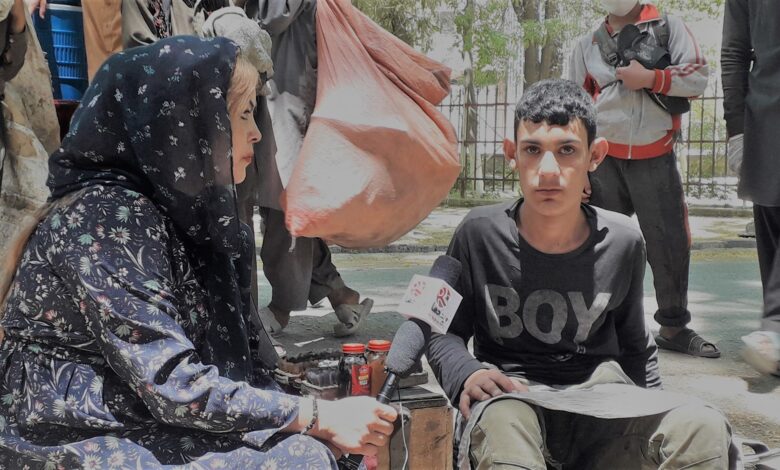Street Children Suffering from Breadwinning

Children are the most vulnerable group of our society. In the four decades of war, this incapable part of society has suffered the most. The destiny of the times that forces this incapable group to do forced and hard work, unfortunately, countless institutions have chanted slogans in defense of the rights of this group, but have not done anything to restore their rights.
Children in our country are hungry in the streets hunting wolves. From dragging these children into begging and sexual exploitation to selling drugs are all things that have a dark future ahead of them.
Zaki, who is 48v years, a resident of Kabul’s first district, says he encounters large numbers of street children leaving home every day. And insists on asking him to buy a gum or pay for his pecans. Working children have found that they have to be persistent in their pursuit of bread. Zaki says he has often encountered children who have urged him to polish his bushes or buy a pen. Zaki wants the government to pay serious attention to children. “The future of society depends on children and how they are raised,” he says. If he imagines a future for a society, it is the children. The collective destiny of the future changes the destiny of a country.
Officials from the Independent Human Rights Commission (IHRC) have also expressed concern about the plight of street children, saying that there are currently 300,000 children working on the streets, most of whom are assigned to hard labor. Working in mines and brick kilns, even being hired for war, is something that children face.
According to Human Rights Commission officials, working children are deprived of their basic human rights. “Although Afghanistan is a party to the Convention on the Rights of the Child, it must act in accordance with its obligations under the Convention,” said Zabihullah Farhang, media officer for the Independent Human Rights Commission. According to Farhang, Afghanistan is required to report annually on the improvement of children and their access to their basic human rights. Farhang emphasizes that the Afghan government has not yet been able to provide a satisfactory report to the international community on the situation of children.
According to the head of the Independent Human Rights Commission, the only solution that can be effective in improving the situation of children is: “Afghanistan’s educational institutions will work for a long time to recognize the fundamental rights of children as a human right; “Because the Afghan government has not yet considered rights as a fundamental human right.”
Defenders of the rights of the children believe that this right will not be taken seriously by the responsible institutions until it is recognized as a “human right”.
Officials at the Ministry of Labor and Social Affairs believe that the war is at the forefront of what drives children to the streets to find a piece of bread.
Abdul Fattah Ashrat Ahmadzai, a spokesman for the Ministry of Labor and Social Affairs, said Afghanistan was a war-torn country that had been affected by the war for four decades. According to him, such a country faces many problems and challenges, including security, which have had a direct impact on children, women and other vulnerable groups. Ahmadzai said the war has claimed many heads of households and orphaned many, leaving the children of the family forced to work in the streets.
However, Ahmadzai announced the rescue of children with the help of UNICEF or the Child Involvement in Mines, and said that the Ministry of Labor and Social Affairs, with the help of this organization, was able to rescue a large number of children who worked in the mines. And provide training for them.
Ahmadzai acknowledges that street children still face many challenges. One in two million children are in hard labor and about 1.9 million children are in hard labor. About three million are living in extreme poverty




